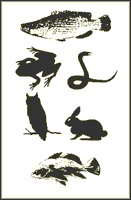Nebraska Cooperative Fish and Wildlife Research Unit

Nebraska Cooperative Fish and Wildlife Research Unit: Staff Publications
Date of this Version
2011
Abstract
Current fisheries management is, unfortunately, reactive rather than proactive to changes in fishery characteristics. Furthermore, anglers do not act independently on waterbodies, and thus, fisheries are complex socio-ecological systems. Proactive management of these complex systems necessitates an approachdadaptive fisheries managementdthat allows learning to occur simultaneously with management. A promising area for implementation of adaptive fisheries management is the study of luring anglers to or from specific waterbodies to meet management goals. Purposeful manipulation of anglers, and its associated field of study, is nonexistent in past management. Evaluation of different management practices (i.e., hypotheses) through an iterative adaptive management process should include both a biological and sociological survey to address changes in fish populations and changes in angler satisfaction related to changes in management. We believe adaptive management is ideal for development and assessment of management strategies targeted at angler participation. Moreover these concepts and understandings should be applicable to other natural resource users such as hunters and hikers.


Comments
Published in Journal of Environmental Management 92 (2011) 1409-1413.